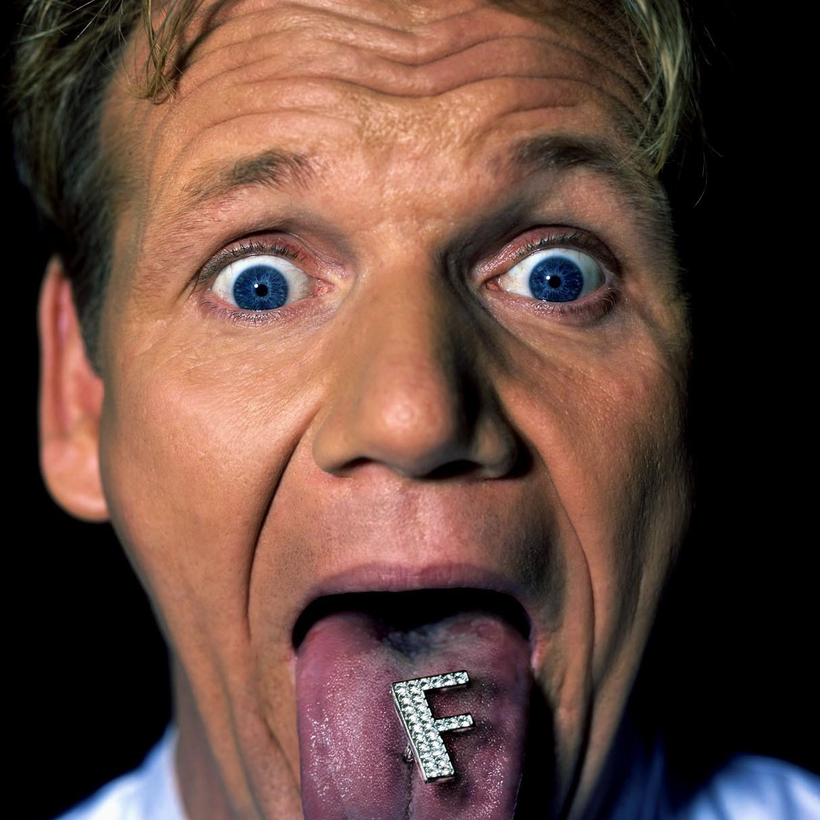Gordon Ramsay once had a popular U.K. television show called The F Word. The title was a playful reference to the chef’s dual offering: steak tartare one minute, human mincemeat the next; the perma-frowned drill sergeant with six Michelin stars and 116 ways to call you an idiot.
But nowadays there are other f’s in the mix, too—and they’ve become just as central to the rolling psychodrama that is Brand Ramsay. Mostly, they spring from a truly flagrant father-in-law—a man accused of federal foibles, falsifying finances, and starting a major family feud. It’s enough to make a man curse. Or comfort-eat.
In November, at London’s High Court, Chris Hutcheson—the father of Ramsay’s wife, Tana—learned that his bankruptcy would be extended by four years. The businessman, the court heard, had slipped some $424,628 to his wife from his share of the proceeds from the sale of his family home, just a few months before applying for bankruptcy in 2018—despite having promised the cash to the tax man. So far, so vanilla. But this is simply the dusting on the soufflé. You have to dig deeper for the broken eggs.
A flagrant father-in-law, federal foibles, falsified finances, and family feuds.
The trouble for Hutcheson goes back a decade, to a time when he and his son-in-law were joint overseers of a splashy (if overstretched) restaurant-and-television empire. Hutcheson, the reportedly notoriously controlling C.E.O. of Gordon Ramsay Holdings Ltd., had supported and mentored the chef since the late 90s—his guru, field marshal, and closest friend.

But then, in October 2010, Hutcheson reportedly learned through a lawyer that his son-in-law had ousted him from the business and hired heavies to blockade him from the company’s Westminster HQ. (Ramsay couldn’t have done the deed himself, Hutcheson claimed, because he was out buying a $314,308 Ferrari.)
Rumors soon swirled of $2 million in loans that Hutcheson had siphoned from the company coffers—an allegation the C.E.O. strongly denied, before hitting back, in a rank-breaking interview with The Mail on Sunday, with tales of a “public hanging” by a “monster” who had become consumed by his own fame.
Ramsay couldn’t have done the deed himself, Hutcheson claimed, because he was out buying a $314,308 Ferrari.
In response, Ramsay wrote a bizarre, mawkish open letter to his mother-in-law via the pages of the London Evening Standard in which he painted Hutcheson as a C-suite Stalin and begged the matriarch not to punish her daughter and grandchildren during the split. Among the histrionics were several clanging euphemisms concerning Hutcheson’s “very complex life,” mainly focused on his corporate junkets, which were “rarely what I thought they were.”
There was soon no need to tiptoe. Despite a last-ditch effort to secure a press gag order, in May of 2011 it emerged, in a high court civil case, that Hutcheson had for decades maintained a second family, entirely unbeknownst to his wife. With a mistress, Ms. Frances Collins, he had raised two children, by then aged 29 and 31.
In 2010, having grown suspicious of his father-in-law, Ramsay hired private detectives to look into Hutcheson’s activities and the company’s finances. Ramsay was right to be paranoid. An expert employed by Ramsay soon discovered that the company’s computer system had been breached, ultimately tracing the intruder’s I.P. addresses to that of Hutcheson and his sons, Adam and Chris (who both held roles at Gordon Ramsay Holdings Ltd. but were dismissed around the time of their father’s sacking). Hutcheson and his co-conspirators, the court was told, had hacked into company e-mails almost 2,000 times between October 2010 and March 2011.
It emerged that Hutcheson had for decades maintained a second family, entirely unbeknownst to his wife.
This seems to have been an exercise in muck spreading as much as anything else. High court judges heard two embarrassing news items that Ramsay attributed to the data breach: one concerning Ramsay’s hair transplant, and another about a shark-fishing trip that tarred the chef as a poseur and hypocrite. (Just a fortnight before the story broke, Ramsay had fronted a weepy documentary campaigning for an end to the slaughter of sharks—and yet here he was, in photos and on video, reportedly hauling in a seven-foot monster during a Florida jaunt.)

In 2017 the father-in-law and his two sons pleaded guilty. Hutcheson was sentenced to six months in prison for the hack, while his two sons received sentences of four months in prison, two years suspended. The judge labeled the trial an “unattractive and unedifying example of dirty linen being washed in public.” (“Guess we have been rumbled,” Hutcheson said to his sons in an e-mail written when the hacks had been discovered around 2011. “Bit late though.”)
By February of the next year, he had applied for bankruptcy—ruined, he told courts, by more than $2.2 million in legal costs and damages. Five months earlier, the court heard this past November, he transferred the money from his house sale to his wife, rather than to the tax authorities, who had come to collect.
In 2017, the father-in-law was sentenced to six months in prison for the hack. The judge labeled the trial an “unattractive and unedifying example of dirty linen being washed in public.”
The internecine war has cooled in the years since. In an interview with The Mail on Sunday in 2018, Tana Ramsay said that she was back in touch with her father, and that he had recently run his 90th marathon with his grandchildren. (Though Ramsay has said he is also in touch with his father-in-law, one imagines less a peace treaty between the two than an armistice in lieu of mutually assured destruction: “I do know where Gordon’s bodies are buried,” the father-in-law brooded back in 2010. “Take me up on the moors and I could show you where.”)
The court banned the bankrupt Hutcheson from running limited companies and ordered him to divulge his bankrupted status when attempting to secure $683 or more in credit. Ramsay, meanwhile, has announced the rollout of at least three new takeaway restaurants in the capital (as soon as coronavirus restrictions permit). “I believe in supporting growth, creating jobs and opportunities,” he said in a statement. Perhaps he could find room somewhere for a septuagenarian burger flipper.
Joseph Bullmore is a Writer at Large for AIR MAIL


